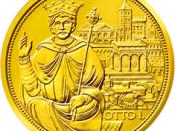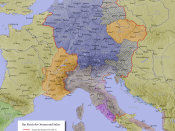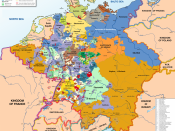Charlemagne
Charlemagne is the most famous ruler of the Medieval Ages and a key figure in all of European history. Charlemagne's greatest impact on European history is the Carolingian Empire (751-987), an empire greater than any known since Ancient Rome. By 800, his empire included two-thirds of Italy, all of present-day France, a small part of Spain, and all of German Saxony. In 800, Charlemagne was crowned emperor, a historic coronation (crowning) in which pope Leo III claimed the political right to give the title "Roman Emperor" to a European King. This essentially ended in the joining of Germanic power and the church as the heritage of the Roman Empire.
During his reign, Charlemagne accomplished a number of things. He strengthened royal power by limiting the authority of nobles, he used judged cases to settle disputes, and revived culture by encouraging learning and surrounding himself scholars. On top of that, he opened a palace school, expanded libraries, ordered monks to make handwritten copies of Latin books, and demanded the creation of more monasteries.
At this time, a new type of writing, known as Carolingian minuscule, came into use. The present-day use of capital and lower-case letters, punctuation, and word spaces, dates from the Carolingian era. Charlemagne also changed European commerce through the construction of new roads and bridges, and through standardized weights, measures, and tolls. He developed a money economy through the minting of the first silver coin since the Roman Empire's denarius. Furthermore, he created a paid civil service, a standing army, a properly maintained network of communication, and a navy for coastal defense. Furthermore, Charlemagne instituted important judicial and legal reforms in his empire by creating many new laws and revising the existing laws of the Franks' canon (church) laws. By doing this, he unified European states, and...


